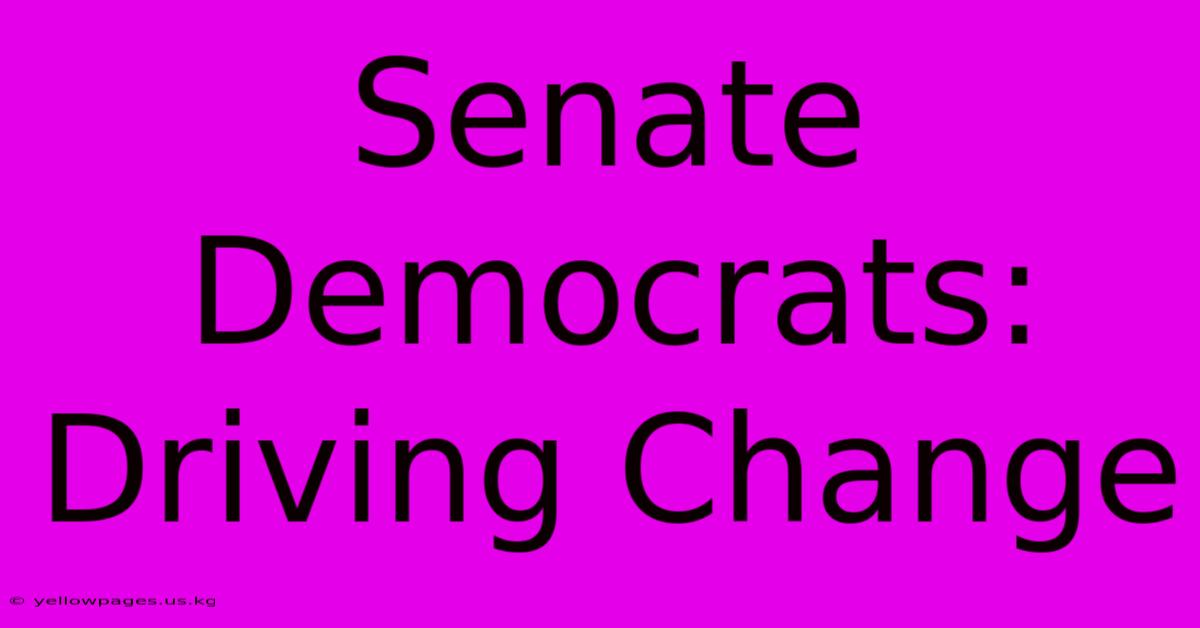Senate Democrats: Driving Change

Discover more detailed and exciting information on our website. Click the link below to start your adventure: Visit Best Website trendingnews.us.kg. Don't miss out!
Table of Contents
Senate Democrats: Driving Change
Senate Democrats have consistently positioned themselves as champions of progressive change, pushing for ambitious legislation across a wide range of policy areas. Their efforts, however, often face significant hurdles in the face of partisan gridlock and Senate rules. This article explores the key policy initiatives championed by Senate Democrats, the challenges they encounter, and the potential impact of their agenda on American society.
Key Policy Initiatives: A Progressive Platform
Senate Democrats' legislative agenda reflects a commitment to addressing some of the nation's most pressing challenges. Several key initiatives stand out:
1. Economic Justice and Inequality:
- Raising the minimum wage: Democrats have consistently advocated for a substantial increase to the federal minimum wage, arguing it's crucial for lifting millions out of poverty and boosting economic growth. This has been a central theme in their platform, though facing significant Republican opposition.
- Tax reform: They propose tax policies aimed at reducing income inequality, including increasing taxes on the wealthy and corporations, and expanding tax credits for low- and middle-income families. These proposals often spark intense debate about economic fairness and the role of government.
- Investing in infrastructure: Democrats emphasize the need for substantial investments in infrastructure projects—roads, bridges, public transit, broadband internet—to create jobs, boost economic competitiveness, and modernize the nation's infrastructure. The bipartisan infrastructure bill represents a significant step, albeit not without compromise.
2. Healthcare Access and Affordability:
- Expanding access to affordable healthcare: A core Democratic priority is expanding access to quality, affordable healthcare for all Americans. This involves efforts to strengthen and expand the Affordable Care Act (ACA), aiming to reduce the number of uninsured Americans.
- Lowering prescription drug costs: Democrats have been vocal in their calls to lower prescription drug prices, arguing that the current system is unsustainable and leaves many struggling to afford essential medications. This fight continues, with ongoing legislative efforts.
- Investing in public health: Strengthening public health infrastructure and addressing health disparities are also key elements of the Democratic platform, with a focus on preventative care and addressing social determinants of health.
3. Climate Change and Environmental Protection:
- Combating climate change: Senate Democrats are at the forefront of efforts to combat climate change, proposing ambitious legislation to reduce greenhouse gas emissions and transition to cleaner energy sources. This includes investments in renewable energy technologies and efforts to reduce reliance on fossil fuels.
- Protecting environmental regulations: Democrats strongly advocate for robust environmental regulations and protections, fighting to prevent rollbacks of existing environmental standards. The fight over environmental regulations continues to be a central point of contention with Republicans.
Challenges and Obstacles: The Path to Progress
Senate Democrats face numerous challenges in advancing their agenda. These include:
- Partisan gridlock: The deeply partisan nature of American politics often leads to legislative gridlock, making it difficult to pass even broadly popular legislation.
- Senate filibuster: The Senate filibuster, a procedural tactic that allows a minority of senators to block legislation, presents a significant obstacle to passing progressive legislation. Reform efforts surrounding the filibuster have seen considerable debate.
- Public opinion: While many Democratic policies enjoy widespread support among their base, achieving broader public consensus can be challenging, particularly on issues like tax increases or significant government spending.
The Potential Impact: Shaping the Future
The success of Senate Democrats' agenda will have a profound impact on American society. Their policy proposals aim to address deep-seated inequalities, improve access to essential services, and create a more sustainable future. However, the effectiveness of these policies hinges on their ability to overcome significant political hurdles and build broader public support. The ongoing political battles and negotiations will shape the nation’s trajectory for years to come. The future will depend heavily on the ongoing efforts of Senate Democrats and the political landscape in which they operate.
Keywords: Senate Democrats, Progressive Legislation, Economic Justice, Healthcare Reform, Climate Change, Political Gridlock, Senate Filibuster, Affordable Care Act (ACA), Infrastructure Investment, Tax Reform, Minimum Wage.

Thank you for visiting our website wich cover about Senate Democrats: Driving Change. We hope the information provided has been useful to you. Feel free to contact us if you have any questions or need further assistance. See you next time and dont miss to bookmark.
Featured Posts
-
First 2025 Polar Vortex Brings Freeze
Jan 01, 2025
-
Michigan State Wisconsin Triple Star Honor
Jan 01, 2025
-
Citrus Bowl Referee Performance Illinois Vs Sc
Jan 01, 2025
-
Kentucky Brown Game Live Stream Info
Jan 01, 2025
-
Lsu Football Texas Bowl Outlook
Jan 01, 2025
